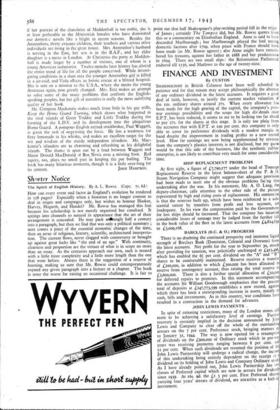Shorter Notice
The Spirit of English History. By A. L. Rowse. (Cape. 7s. 6d.)
How can every event and factor in England's evolution be rendered in 128 pages? Especially when a historian is no longer content to deal in reigns and campaigns only, but wishes to honour Hooker, Harvey, Hogarth, and Handel? Mr. Rowse has managed this feat because his scholarship is not merely organised but canalised. It springs into channels so natural in appearance that the art of their arrangement is concealed. He may pack seseningly half a century into a paragraph, but then we find that was only a political summary ; next comes a piece of the essential economic changes of the time, then an array of religious, literary, scientific, architectural interpreta- tion. The current flows, never clogged with controversy or brought up against great locks like "the end of an age." With continuity, clearness and proportion are the virtues of what is in scope no more than an essay. As the centuries approach our own, each is treated with a little more complexity and a little more length than the one that went before. Always there is the suggestion of a reserve of learning, making us sure that Mr. Rowse could extemporaneously expand any given paragraph into a lecture or a chapter. The book is none the worse for raising an occasional challenge. It is fair to
point out that half Shakespeare's play-writing period fell in the reign of James ; certainly The Tempest did, but Mr. Rowse quotes from this as a commentary on Elizabethan England. Anne is said to have discarded Marlborough ; but Marlborough played the fool among domestic .factions after 17o9, when peace with France should have been made (as Mr. Rowse agrees) ; also Anne might have remem. bered his treasons, against her. father in 1688 and her predecessors in 1694. There are two small slips: the Reformation Parliament endured till 1536, and Marlowe to the age of twenty-nine.


























 Previous page
Previous page